Global Health: Indonesia's Healthcare Challenges Report
VerifiedAdded on 2023/06/05
|5
|919
|82
Report
AI Summary
This report provides an overview of global health challenges in Indonesia, focusing on the impact of infectious diseases like tuberculosis and the broader issues within the healthcare system. It highlights key contributing factors to these challenges, including the unavailability and inadequacy of health services, as well as the high costs associated with healthcare. The report analyzes the consequences of these factors, such as limited access to healthcare, especially for low-income families. The conclusion reinforces the main arguments, emphasizing the need for improved healthcare infrastructure, a sufficient number of healthcare workers, and measures to reduce healthcare costs to address the global health issues in Indonesia. The report is based on the assignment brief which requires an introduction, main body with contributing factors, conclusion, and proper referencing using CDU APA 7th style.
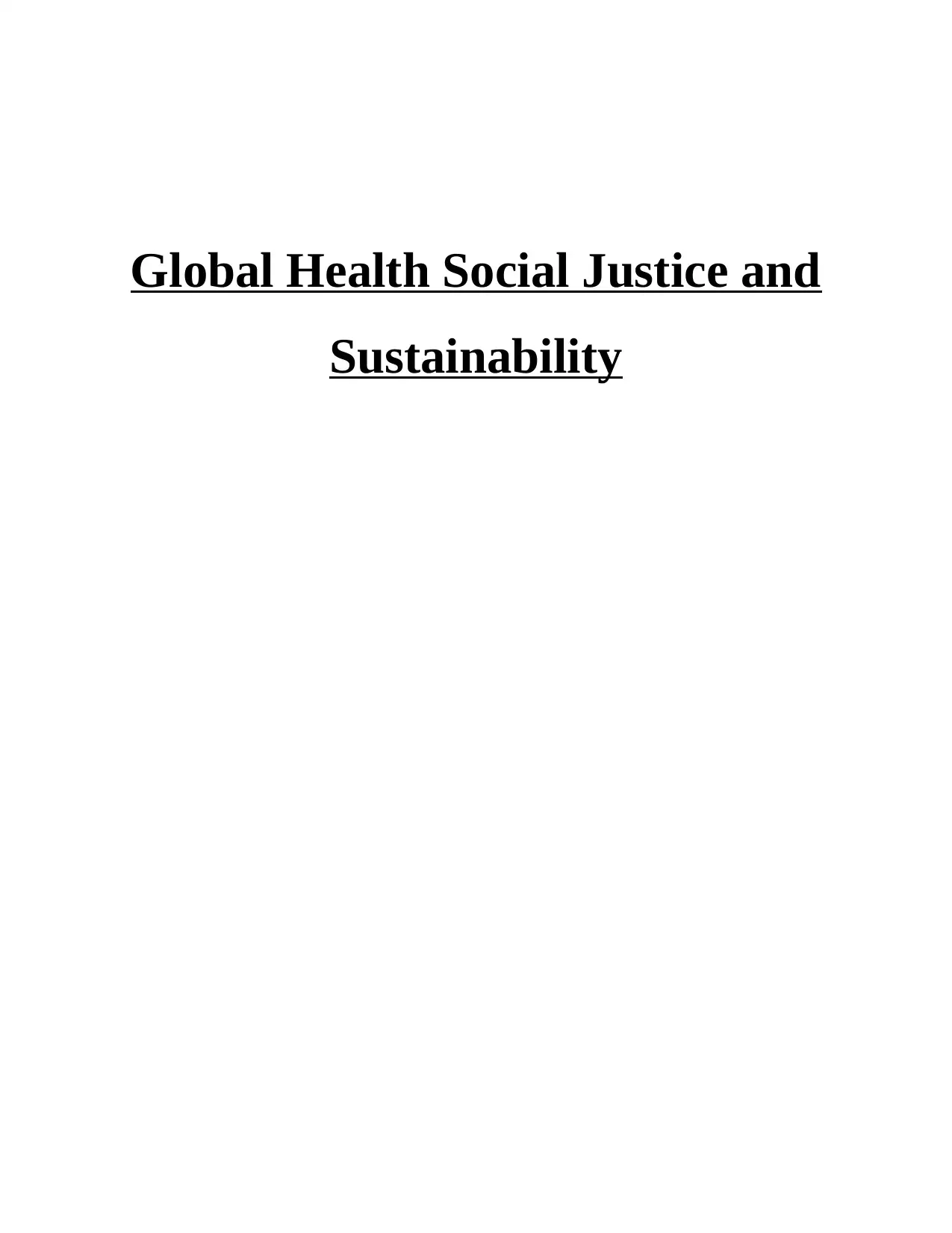
Global Health Social Justice and
Sustainability
Sustainability
Paraphrase This Document
Need a fresh take? Get an instant paraphrase of this document with our AI Paraphraser
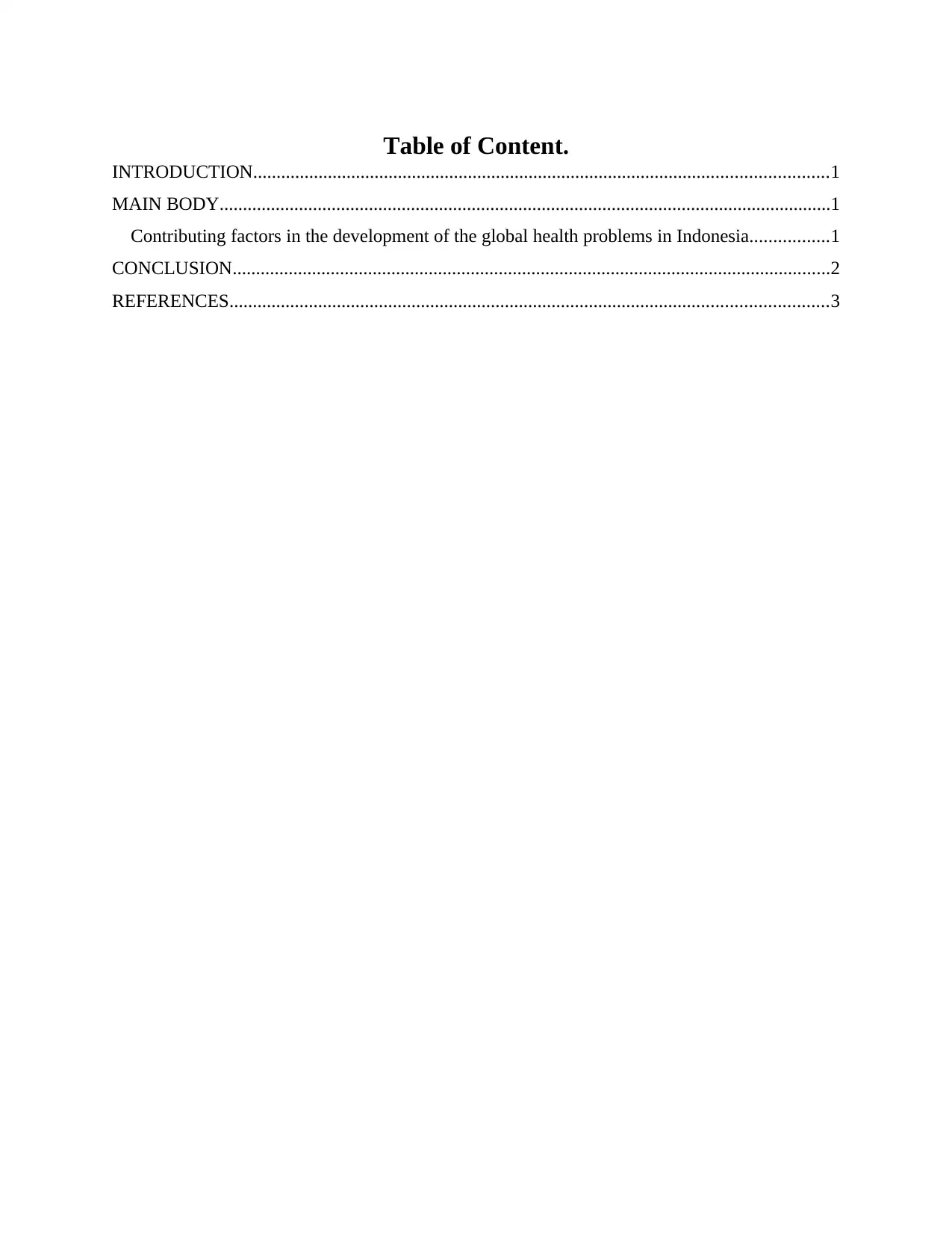
Table of Content.
INTRODUCTION...........................................................................................................................1
MAIN BODY...................................................................................................................................1
Contributing factors in the development of the global health problems in Indonesia.................1
CONCLUSION................................................................................................................................2
REFERENCES................................................................................................................................3
INTRODUCTION...........................................................................................................................1
MAIN BODY...................................................................................................................................1
Contributing factors in the development of the global health problems in Indonesia.................1
CONCLUSION................................................................................................................................2
REFERENCES................................................................................................................................3
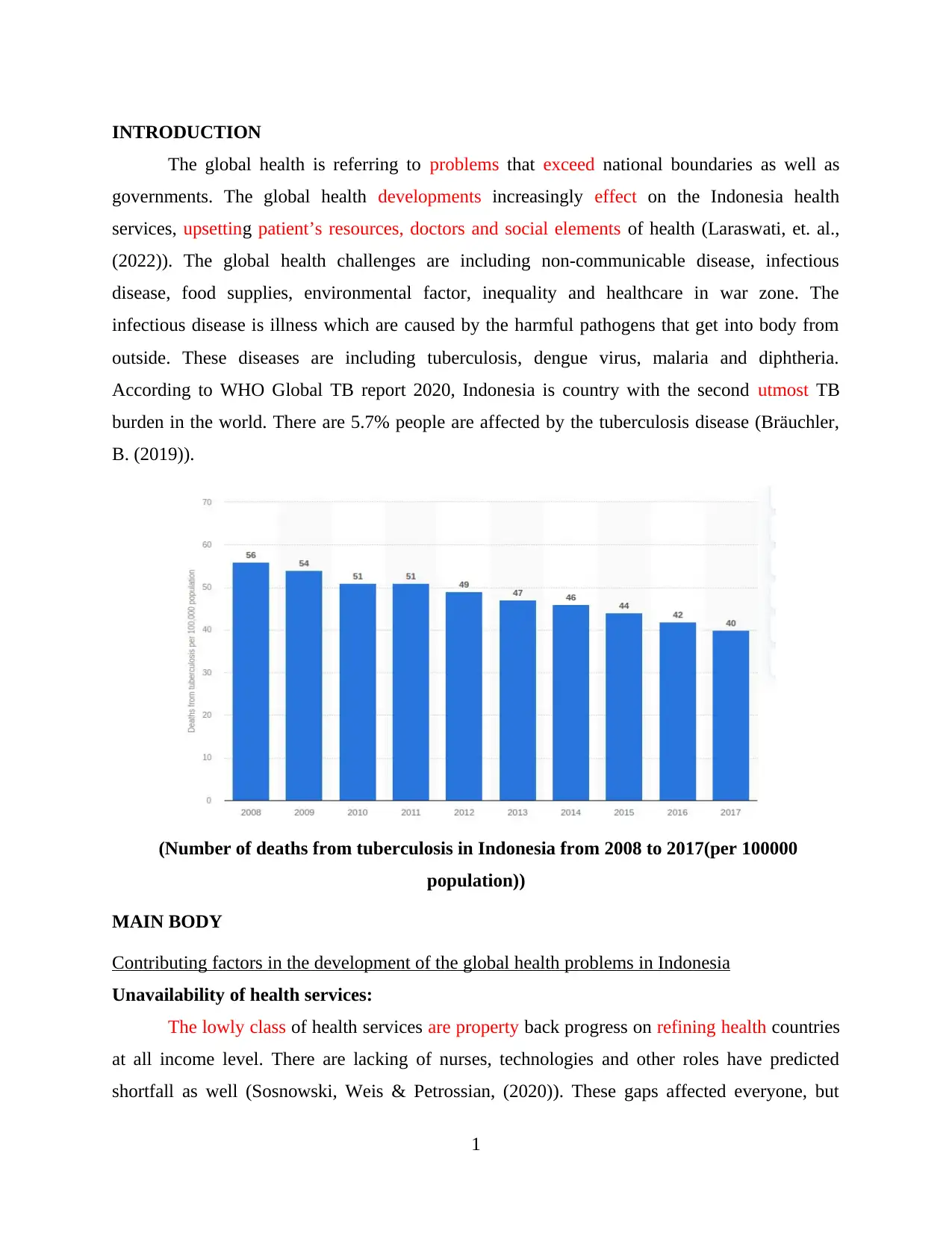
INTRODUCTION
The global health is referring to problems that exceed national boundaries as well as
governments. The global health developments increasingly effect on the Indonesia health
services, upsetting patient’s resources, doctors and social elements of health (Laraswati, et. al.,
(2022)). The global health challenges are including non-communicable disease, infectious
disease, food supplies, environmental factor, inequality and healthcare in war zone. The
infectious disease is illness which are caused by the harmful pathogens that get into body from
outside. These diseases are including tuberculosis, dengue virus, malaria and diphtheria.
According to WHO Global TB report 2020, Indonesia is country with the second utmost TB
burden in the world. There are 5.7% people are affected by the tuberculosis disease (Bräuchler,
B. (2019)).
(Number of deaths from tuberculosis in Indonesia from 2008 to 2017(per 100000
population))
MAIN BODY
Contributing factors in the development of the global health problems in Indonesia
Unavailability of health services:
The lowly class of health services are property back progress on refining health countries
at all income level. There are lacking of nurses, technologies and other roles have predicted
shortfall as well (Sosnowski, Weis & Petrossian, (2020)). These gaps affected everyone, but
1
The global health is referring to problems that exceed national boundaries as well as
governments. The global health developments increasingly effect on the Indonesia health
services, upsetting patient’s resources, doctors and social elements of health (Laraswati, et. al.,
(2022)). The global health challenges are including non-communicable disease, infectious
disease, food supplies, environmental factor, inequality and healthcare in war zone. The
infectious disease is illness which are caused by the harmful pathogens that get into body from
outside. These diseases are including tuberculosis, dengue virus, malaria and diphtheria.
According to WHO Global TB report 2020, Indonesia is country with the second utmost TB
burden in the world. There are 5.7% people are affected by the tuberculosis disease (Bräuchler,
B. (2019)).
(Number of deaths from tuberculosis in Indonesia from 2008 to 2017(per 100000
population))
MAIN BODY
Contributing factors in the development of the global health problems in Indonesia
Unavailability of health services:
The lowly class of health services are property back progress on refining health countries
at all income level. There are lacking of nurses, technologies and other roles have predicted
shortfall as well (Sosnowski, Weis & Petrossian, (2020)). These gaps affected everyone, but
1
⊘ This is a preview!⊘
Do you want full access?
Subscribe today to unlock all pages.

Trusted by 1+ million students worldwide
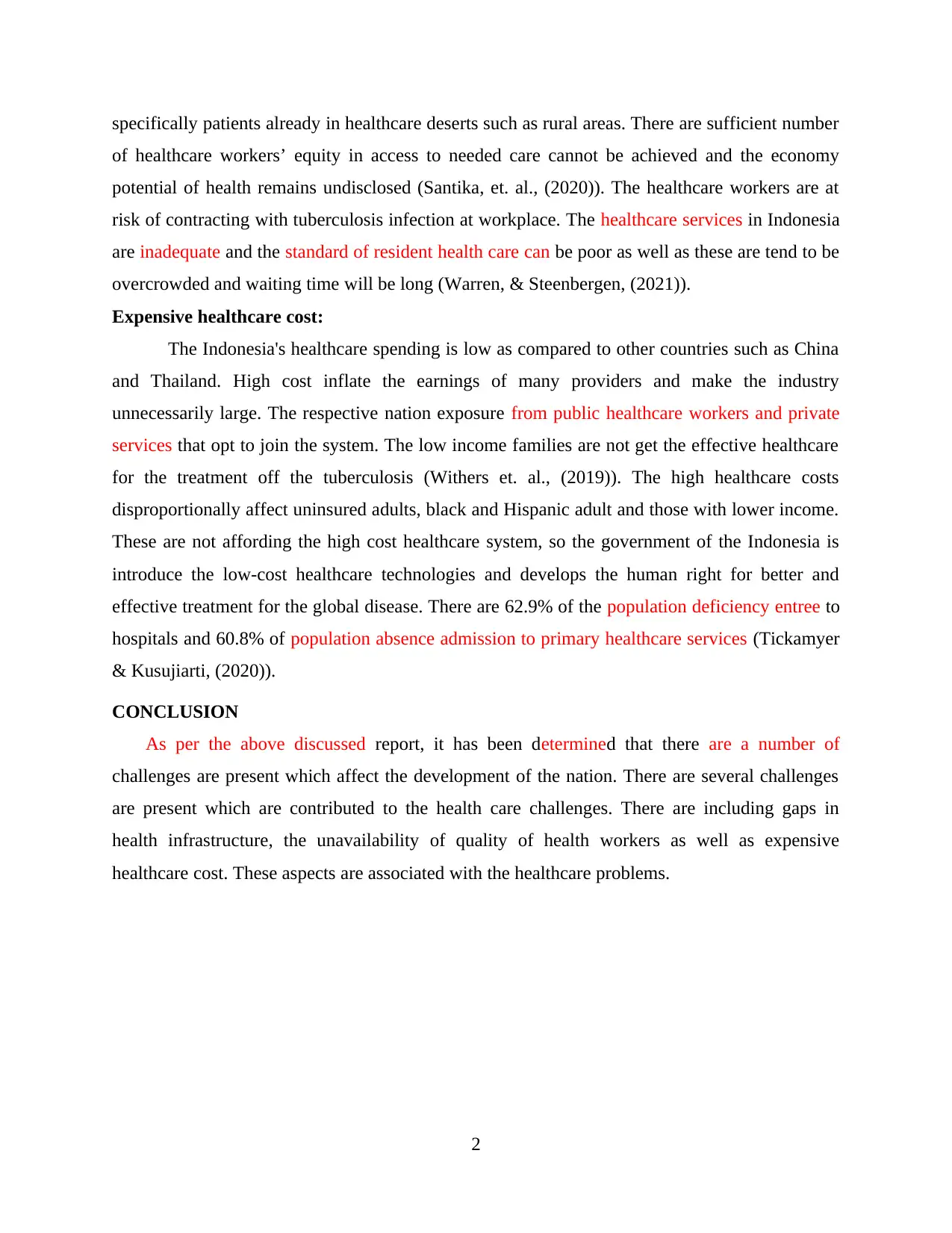
specifically patients already in healthcare deserts such as rural areas. There are sufficient number
of healthcare workers’ equity in access to needed care cannot be achieved and the economy
potential of health remains undisclosed (Santika, et. al., (2020)). The healthcare workers are at
risk of contracting with tuberculosis infection at workplace. The healthcare services in Indonesia
are inadequate and the standard of resident health care can be poor as well as these are tend to be
overcrowded and waiting time will be long (Warren, & Steenbergen, (2021)).
Expensive healthcare cost:
The Indonesia's healthcare spending is low as compared to other countries such as China
and Thailand. High cost inflate the earnings of many providers and make the industry
unnecessarily large. The respective nation exposure from public healthcare workers and private
services that opt to join the system. The low income families are not get the effective healthcare
for the treatment off the tuberculosis (Withers et. al., (2019)). The high healthcare costs
disproportionally affect uninsured adults, black and Hispanic adult and those with lower income.
These are not affording the high cost healthcare system, so the government of the Indonesia is
introduce the low-cost healthcare technologies and develops the human right for better and
effective treatment for the global disease. There are 62.9% of the population deficiency entree to
hospitals and 60.8% of population absence admission to primary healthcare services (Tickamyer
& Kusujiarti, (2020)).
CONCLUSION
As per the above discussed report, it has been determined that there are a number of
challenges are present which affect the development of the nation. There are several challenges
are present which are contributed to the health care challenges. There are including gaps in
health infrastructure, the unavailability of quality of health workers as well as expensive
healthcare cost. These aspects are associated with the healthcare problems.
2
of healthcare workers’ equity in access to needed care cannot be achieved and the economy
potential of health remains undisclosed (Santika, et. al., (2020)). The healthcare workers are at
risk of contracting with tuberculosis infection at workplace. The healthcare services in Indonesia
are inadequate and the standard of resident health care can be poor as well as these are tend to be
overcrowded and waiting time will be long (Warren, & Steenbergen, (2021)).
Expensive healthcare cost:
The Indonesia's healthcare spending is low as compared to other countries such as China
and Thailand. High cost inflate the earnings of many providers and make the industry
unnecessarily large. The respective nation exposure from public healthcare workers and private
services that opt to join the system. The low income families are not get the effective healthcare
for the treatment off the tuberculosis (Withers et. al., (2019)). The high healthcare costs
disproportionally affect uninsured adults, black and Hispanic adult and those with lower income.
These are not affording the high cost healthcare system, so the government of the Indonesia is
introduce the low-cost healthcare technologies and develops the human right for better and
effective treatment for the global disease. There are 62.9% of the population deficiency entree to
hospitals and 60.8% of population absence admission to primary healthcare services (Tickamyer
& Kusujiarti, (2020)).
CONCLUSION
As per the above discussed report, it has been determined that there are a number of
challenges are present which affect the development of the nation. There are several challenges
are present which are contributed to the health care challenges. There are including gaps in
health infrastructure, the unavailability of quality of health workers as well as expensive
healthcare cost. These aspects are associated with the healthcare problems.
2
Paraphrase This Document
Need a fresh take? Get an instant paraphrase of this document with our AI Paraphraser
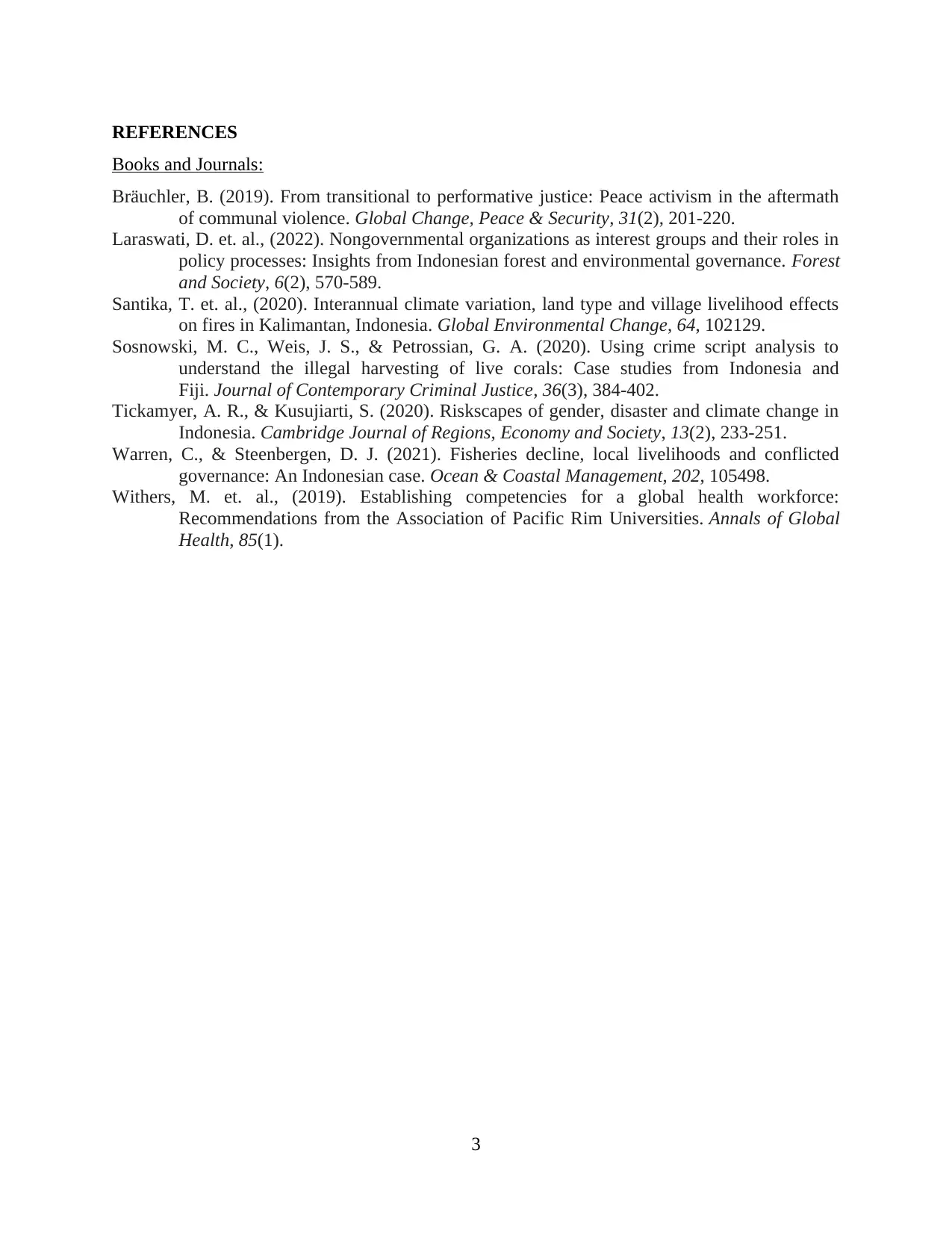
REFERENCES
Books and Journals:
Bräuchler, B. (2019). From transitional to performative justice: Peace activism in the aftermath
of communal violence. Global Change, Peace & Security, 31(2), 201-220.
Laraswati, D. et. al., (2022). Nongovernmental organizations as interest groups and their roles in
policy processes: Insights from Indonesian forest and environmental governance. Forest
and Society, 6(2), 570-589.
Santika, T. et. al., (2020). Interannual climate variation, land type and village livelihood effects
on fires in Kalimantan, Indonesia. Global Environmental Change, 64, 102129.
Sosnowski, M. C., Weis, J. S., & Petrossian, G. A. (2020). Using crime script analysis to
understand the illegal harvesting of live corals: Case studies from Indonesia and
Fiji. Journal of Contemporary Criminal Justice, 36(3), 384-402.
Tickamyer, A. R., & Kusujiarti, S. (2020). Riskscapes of gender, disaster and climate change in
Indonesia. Cambridge Journal of Regions, Economy and Society, 13(2), 233-251.
Warren, C., & Steenbergen, D. J. (2021). Fisheries decline, local livelihoods and conflicted
governance: An Indonesian case. Ocean & Coastal Management, 202, 105498.
Withers, M. et. al., (2019). Establishing competencies for a global health workforce:
Recommendations from the Association of Pacific Rim Universities. Annals of Global
Health, 85(1).
3
Books and Journals:
Bräuchler, B. (2019). From transitional to performative justice: Peace activism in the aftermath
of communal violence. Global Change, Peace & Security, 31(2), 201-220.
Laraswati, D. et. al., (2022). Nongovernmental organizations as interest groups and their roles in
policy processes: Insights from Indonesian forest and environmental governance. Forest
and Society, 6(2), 570-589.
Santika, T. et. al., (2020). Interannual climate variation, land type and village livelihood effects
on fires in Kalimantan, Indonesia. Global Environmental Change, 64, 102129.
Sosnowski, M. C., Weis, J. S., & Petrossian, G. A. (2020). Using crime script analysis to
understand the illegal harvesting of live corals: Case studies from Indonesia and
Fiji. Journal of Contemporary Criminal Justice, 36(3), 384-402.
Tickamyer, A. R., & Kusujiarti, S. (2020). Riskscapes of gender, disaster and climate change in
Indonesia. Cambridge Journal of Regions, Economy and Society, 13(2), 233-251.
Warren, C., & Steenbergen, D. J. (2021). Fisheries decline, local livelihoods and conflicted
governance: An Indonesian case. Ocean & Coastal Management, 202, 105498.
Withers, M. et. al., (2019). Establishing competencies for a global health workforce:
Recommendations from the Association of Pacific Rim Universities. Annals of Global
Health, 85(1).
3
1 out of 5
Related Documents
Your All-in-One AI-Powered Toolkit for Academic Success.
+13062052269
info@desklib.com
Available 24*7 on WhatsApp / Email
![[object Object]](/_next/static/media/star-bottom.7253800d.svg)
Unlock your academic potential
Copyright © 2020–2026 A2Z Services. All Rights Reserved. Developed and managed by ZUCOL.





